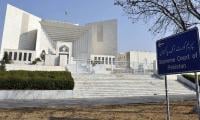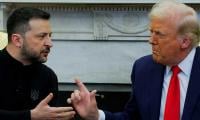BERLIN: Britain, France and Germany made a last-ditch appeal on Monday to US President Donald Trump not to abandon the Iran nuclear deal as a key deadline approaches, warning that scrapping it would spark an "escalation".
Trump has threatened to withdraw from the 2015 pact when it comes up for renewal on May 12, and to reimpose sanctions unless European signatory states fix its "terrible flaws". German Foreign Minister Heiko Maas warned that the accord’s collapse could spark "an escalation" in the region and stressed that Washington’s key European allies remain convinced saving it "makes the world a safer place".
His French counterpart Jean-Yves Le Drian, on a Berlin visit, said that the agreement is "the right way to stop Iran from getting access to nuclear weapons" and "will save us from nuclear proliferation".
British Foreign Secretary Boris Johnson, who was visiting Washington Monday, cautioned that "at this delicate juncture, it would be a mistake to walk away from the nuclear agreement and remove the restraints that it places on Iran".
"Now that these handcuffs are in place, I see no possible advantage in casting them aside," Johnson wrote in The New York Times. He argued that "every available alternative is worse", adding that "the wisest course would be to improve the handcuffs rather than break them".
Under the landmark nuclear pact, also signed by Russia and China, Iran pledged not to build a nuclear bomb in return for relief from international sanctions. Trump has consistently complained about the agreement, reached under his predecessor Barack Obama, citing perceived flaws including "sunset" provisions lifting some nuclear restrictions from 2025.
In an attempt to salvage the deal, French President Emmanuel Macron has pushed to extend its scope to address this issue, as well as Iran’s missile capabilities and its role in the region. Israel has also pushed to have the accord ditched, arguing that intelligence documents it recently unveiled showed that Iran had had a secret atomic weapons programme which it could re-activate at any time.
Britain, France and other signatories have said those arguments only strengthened the case for the deal, which has safeguards in place designed to keep Iran from pursuing atomic weapons. Johnson was on Monday to start a two-day visit to Washington, with the nuclear deal top of the agenda, the Foreign Office said.
An image of Antarctic sea ice. —AFP/FileWASHINGTON: The Earth´s next ice age is expected to begin in about 11,000...
A seven-month-old baby and her mother look at early flowering Kanzakura cherry blossoms in full bloom at the Shinjuku...
Undocumented migrants who arrived in the UK after crossing the Channel in small boats can be seen. —AFP/FileLONDON:...
US President Donald Trump. —AFP/FileWASHINGTON: US President Donald Trump on Thursday said his proposed 25 percent...
People look out from a hotel where migrants from Asia and the Middle East are housed after being deported to Panama....
Representational photo of US army soldiers in position. —TheNews/FileWASHINGTON: The United States will remove...







